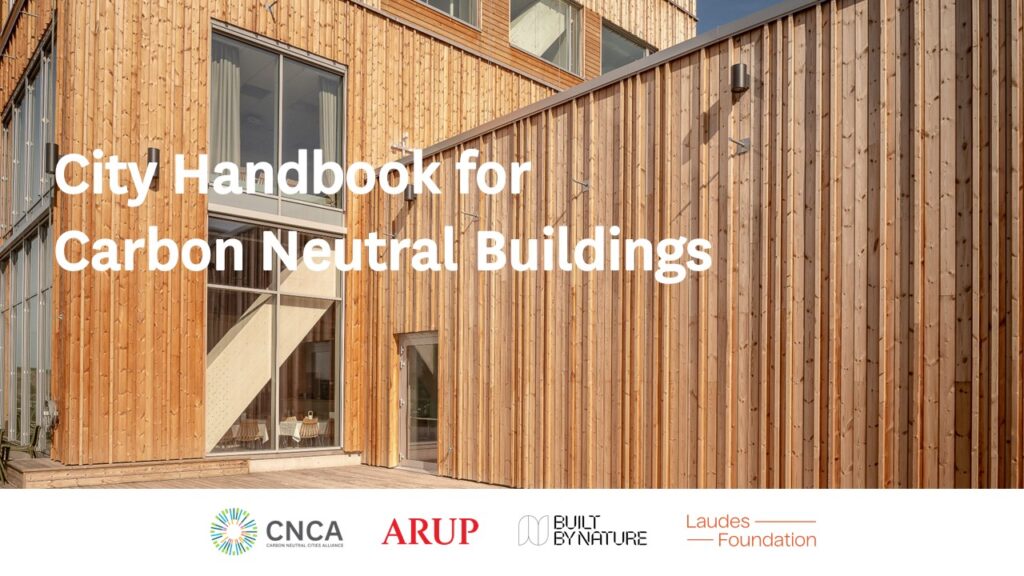For Immediate Release
March 7, 2024
CNCA Launches City Handbook for Carbon Neutral Buildings
Some of the world’s most climate-ambitious cities – members of the Carbon Neutral Cities Alliance (CNCA) – have joined forces to reduce CO2 emissions associated with construction materials in their cities.
CNCA has been spearheading a multi-year effort supporting cities mapping and piloting innovative policies to reduce embodied carbon in the built environment, which is the CO2 footprint across the entire lifecycle of a building – from the production of building materials to their transportation, assemblage, and treatment after demolition.
In joining forces to produce the City Handbook for Carbon Neutral Buildings, CNCA and its partner cities herald the need for a paradigm shift in material selection towards low-carbon alternatives to traditional materials. CNCA commissioned Arup to produce the Handbook specifically to help cities facilitate the use of bio-based building materials in construction, and it includes everything from timber and seaweed to hemp and rice fibres.
In the best-case scenario, bio-based materials can actually help make buildings carbon-positive by locking biogenic carbon into the materials themselves and storing it over the life of the product. A fundamental barrier to working with new materials in the construction industry is knowledge and accessibility, which is why the Handbook offers a professional guide for policymakers and practitioners worldwide.
While the technical solutions exist, there’s a need to level the playing field for new low-carbon building materials to be competitive with traditional building methods – including for the use of bio-based building materials. For that to happen cities are working on removing regulatory hurdles (think zoning and building codes) for both renovation and new construction, and retooling public procurement requirements.
The City Handbook for Carbon Neutral Buildings was developed with valuable input from city officials in Europe and North America and key stakeholders throughout the procurement chain. The handbook is a collaborative effort, made possible with the support of the Laudes Foundation and Built by Nature, and will equip cities worldwide with knowledge and guidance for the use of sustainable, bio-based building materials.
Simone Mangili, CNCA’s Executive Director, notes: “The Buildings Breakthrough unveiled at COP28, along with the launch of the Forest Climate Leadership Partnership, set the stage for the built environment to play an increasingly central role on the path to 1.5 degrees. At the same time, the Coalition of High Ambition Multilevel Partnership (CHAMP) initiative, also launched at COP28, solidifies the role of subnationals including cities – where most buildings are located – in delivering nationally determined contributions (NDCs) to reach the goals set out in the Paris Agreement. By making low-carbon, bio-based building materials more accessible, this handbook helps cities lead the transition in the built environment.”
Handbook author Peter Vangsbo, Head of Sustainability and Climate Services at Arup, noted: “Half of a building’s CO2 footprint throughout its lifetime comes from the production and construction phase. Globally, we are facing a construction boom of approximately 2 billion new square meters every year until 2028, and therefore it is imperative that the world learns to build with the latest green methods, technologies and not least materials”.
The handbook consists of guidance on both the use and purchasing of bio-based and low-carbon materials, including a material catalogue of bio-based alternatives for structures, cladding and insulation.
“In the journey towards decarbonizing our built environment, this handbook for carbon neutral buildings with bio-based materials acts as a fundamental tool. It equips cities with the necessary resources to accelerate the transition to a low-carbon future, enabling them to harness sustainable materials effectively” says Tanja Tyvimaa, Senior Specialist in Carbon Neutrality and Circular Economy in Construction at the City of Tampere – one of the 12 partner cities leading this initiative.
Paul King, CEO of Built by Nature, whose vision is for a built environment to work in unison with nature, says: “We know how we can build and retrofit the affordable and resilient homes and buildings people need around the world using low-carbon, renewable bio-based materials. We now urgently need governments and industry to collaborate and drive investment in biobased materials and sustainable forest management to capitalise on this tremendous opportunity and deliver the best environmental, social and economic outcomes as part of a just transition towards a decarbonised built environment.”
Read about CNCA’s work with embedded CO2 here and read more about Arup’s work in designing and shaping sustainable cities here.
The City Handbook for Carbon Neutral Buildings is available for download here.
About Carbon Neutral Cities Alliance:
The Carbon Neutral Cities Alliance is a collaboration of leading global cities achieving carbon neutrality in the next 10-20 years — the most aggressive GHG reduction targets undertaken anywhere by any city. While it is possible for cities to achieve their interim carbon reduction targets through incremental improvements to existing systems, achieving carbon neutrality requires radical, transformative changes to core city systems. CNCA’s mission is to mobilize transformative climate action in cities in order to achieve prosperity, social equity, resilience and better quality of life for all on a thriving planet.
About Laudes Foundation:
Laudes Foundation is an independent foundation joining the growing movement to accelerate the transition to a climate-positive and inclusive global economy. Responding to the dual crises of climate breakdown and inequality, Laudes supports brave action that inspires and challenges industry to harness its power for good. Part of the Brenninkmeijer family enterprise, Laudes builds on six generations of entrepreneurship and philanthropy, working collaboratively to both influence finance and capital markets and transform industry with a focus on the built environment and fashion. For more information visit LaudesFoundation.org.
Media Contact:
Michael Shank, CNCA Director of Engagement
michaelshank@carbonneutralcities.org
Program Contact:
Irene García, CNCA Built Environment Lead
irenegarcia@carbonneutralcities.org
###



